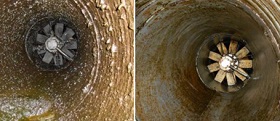Safe ductwork - Loss Prevention Standard (LPS 2084)
The Regulatory Reform (Fire Safety) Order 2005 requires that a building’s owner or workplace manager nominates a responsible person to identify all possible sources of fire and eliminate, or at least minimise the risk, to the building’s occupants.
Regular kitchen extraction cleaning will remove one of the most common causes of fire within the kitchen and is imperative to ensure the safety of the building and its occupants and reduce the risk of a fire caused by grease build-up in the extraction system.
Regardless of the efficiency of canopy filters, it is inevitable that grease deposits will build up over time in kitchen extraction ductwork and canopies. If left, grease will become baked on and carbonised making it extremely difficult to remove, thus reducing the effectiveness of the extraction system, potentially shortening the life of the fan and creating a serious fire hazard that may propagate around the building.
The Loss Prevention Standard (LPS 2084), published in May 2017 by BRE Global, seeks to minimise fire risk from ducting. It was prepared in response to issues caused by ineffective cleaning and maintenance and defines the Loss Prevention Certification Board (LPCB) requirements for the approval of companies carrying out inspection, cleaning and maintenance of ductwork systems that may be contaminated with combustible deposits.
Using a company certified to LPS 2084 will give clients the assurance that the cleaning and maintenance of their ductwork systems has been carried out correctly.
Certified companies with LPS 2084 have to:
- Meet the requirements of the client contract.
- Document and report correctly.
- Identify and record areas of limited access where inspection, cleaning and maintenance are impractical and communicate these limitations to the client.
- Provide recommendations for access improvements to better facilitate the ongoing cleaning and maintenance of the ductwork system.
LPS 2084 is of great importance in an industry with little regulation.
Certified companies will be audited by BRE Global on a regular basis to ensure they continue to adhere to the requirements of the standard. Auditors will check records and supporting documentation covering the contract itself, storage and handling of cleaning materials, disposal, training and so on.
Specifying LPCB approved products and services enables the responsible person to reduce risk by showing due-diligence in the selection of products and services that can be trusted to perform as specified.
This article was originally published here on 17 July 2017 by BRE Group.
[edit] Find out more
[edit] Related articles on Designing Buildings Wiki
Featured articles and news
Infrastructure that connect the physical and digital domains.
Harnessing robotics and AI in challenging environments
The key to nuclear decommissioning and fusion engineering.
BSRIA announces Lisa Ashworth as new CEO
Tasked with furthering BSRIA’s impressive growth ambitions.
Public buildings get half a million energy efficiency boost
£557 million to switch to cleaner heating and save on energy.
CIOB launches pre-election manifesto
Outlining potential future policies for the next government.
Grenfell Tower Inquiry announcement
Phase 2 hearings come to a close and the final report due in September.
Progress from Parts L, F and O: A whitepaper, one year on.
A replicated study to understand the opinion of practitioners.
ECA announces new president 2024
Electrical engineer and business leader Stuart Smith.
A distinct type of countryside that should be celebrated.
Should Part O be extended to existing buildings?
EAC brands heatwave adaptation a missed opportunity.
Definition of Statutory in workplace and facilities management
Established by IWFM, BESA, CIBSE and BSRIA.
Tackling the transition from traditional heating systems
59% lack the necessary information and confidence to switch.
The general election and the construction industry
As PM, Rishi Sunak announces July 4 date for an election.
Eco apprenticeships continue help grow green workforce
A year after being recognised at the King's coronation.
Permitted development rights for agricultural buildings
The changes coming into effect as of May 21, 2024.























